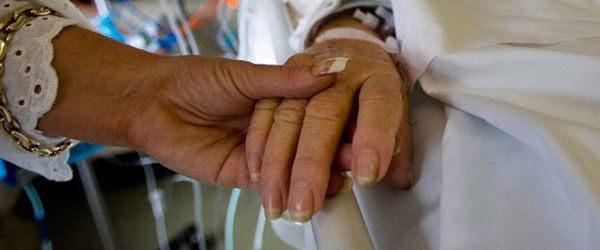Today, among many of us church-goers, there is growing-propensity to self-protect rather than risk crucifixion for the world. We are well-intentioned in this, but, good intentions notwithstanding, our actions are the opposite of Jesus. He loved the world enough to let himself be crucified rather than self-protect. We see this propensity for self-protection everywhere inside our churches today, albeit it is not without cause. In most parts of the world, the church is under siege in some fashion, either because of active persecution or simply because it's being disrespected, unfairly perceived and unfairly treated. Secularized culture carries inside itself a certain anti-Christian and anti-ecclesial bias, and many church-people feel that this bias is the last prejudice that is still intellectually acceptable in our culture. And this isn't simple paranoia. There's some substance to it. Secular culture has its virtues, but it is also clearly somewhat immature and grandiose in its relationship to its Judeo-Christian heritage. Not unlike an adolescent feeling his or her own strength for the first time, it can be overly critical and bitterly unfair to its own parentage. Adolescents are often very hard on their parents and secular culture is often very hard on its Judeo-Christian heritage. Given this fact, I can understand why so many church leaders and concerned church members today are becoming more and more defensive. However, while I understand the instinct behind this, I cannot agree with the response, namely, our propensity to circle the wagons, batten down the hatches, and see our culture as an enemy against which we need to protect ourselves rather than as the world that Jesus died for and which we are called to love and save. Why is self-protection wrong, given all the reasons that seem to call for it? What's wrong with our propensity to self-protect is that it's the exact opposite of what Jesus did. We see this everywhere in the Gospels. Jesus' disciples were forever trying to protect him from various groups whom they deemed unworthy of his presence, and Jesus was forever clear that he didn't need or want to be protected: "Let them come to me!" was one of his mantras. Moreover, and more importantly, his disciples were also trying to protect him against persons and things they deemed as a threat to him. Thus they tried to talk him out of accepting his crucifixion and, indeed, at the time of his arrest, tried to protect him through violent resistance, the sword. As he was being arrested, they asked him: “Should we use force to protect you? Should we strike with the sword?” Sadly, they didn't wait for his answer and Peter, trying to protect him, did strike with the sword, cutting off the ear of one of the men arresting Jesus. What was Jesus' response to this effort at protection? We have his words: No more of this! But we don't have the tone of those words. Were they spoken in anger, as sharp reprimand? Were they spoken in frustration, recognizing that Peter, the rock, the future pope, had so badly misunderstood his message? Or, were they spoken in that sad tone a mother uses when she tells her children to stop fighting even as the resignation in her voice betrays the fact that she knows they never will? Whatever the tone, the message is clear: His first followers didn't understand one of the central things about their master. Jesus had spent his entire ministry healing people, including healing diseased ears so that people might hear again, and on his last night on earth the leader of his apostles cuts off the ear of someone in an attempt to protect him. The lesson is in the irony: Jesus' healing of ears had revealed his longing for dialogue and Peter's severing of an ear had revealed his itch to cut off dialogue. Jesus' whole person and message had incarnated and preached vulnerability and radical acceptance of crucifixion rather than self-protection and his followers, at the first show of hostility, had responded with violence and self-protection. That lesson shouldn't be lost: Everything about Jesus speaks of vulnerability rather than self-protection. He was born in a manger, a feeding trough, a place where animals come to eat, and he ends up on a table, "flesh for the life of the world," to be eaten up by the world; the first words out of his mouth call for metanoia, the opposite of paranoia; and in the end he gives himself over to crucifixion rather than to self-protection. That was Jesus' response to a world that grossly misunderstood him and violently mistreated him. He opened his arms in vulnerability rather than closed his fists in self-defense. And in that's how, ideally, we should respond to the world when it's unfair to us. Unlike Peter, who instinctually struck with the sword without remembering Jesus' message, we shouldn't let an outside threat erase what was so central to Jesus' person and teaching and respond in a manner antithetical to the Gospel, hostility for hostility, immaturity for immaturity. Oblate of Mary Immaculate Father Ronald Rolheiser is a specialist in the field of spirituality and systematic theology. His website is www.ronrolheiser.com.

